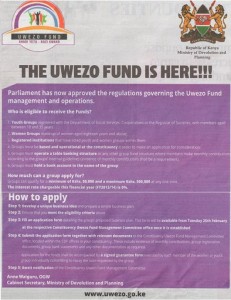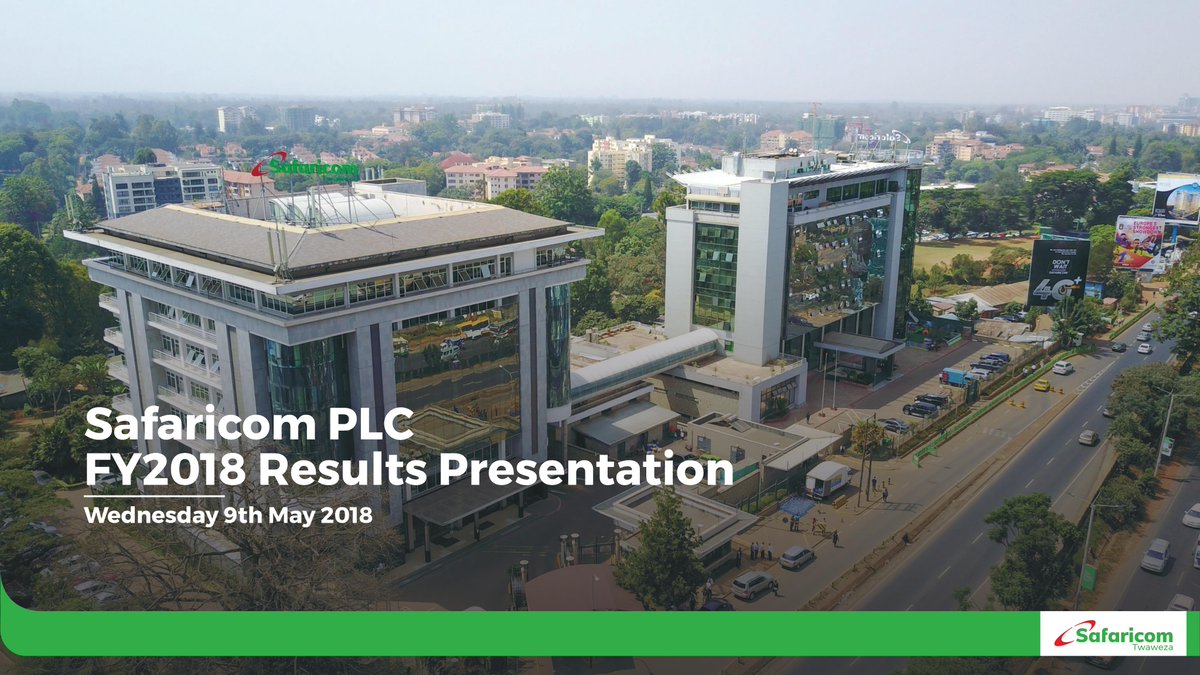Uwezo Fund: Why Does The Government Ignore The Obvious?
So the Uwezo Youth Fund is here! I love the idea of funding youth (and women) for business, and building enterprise. Enabling entrepreneurship is a sure way of creating employment. According to the website, the Uwezo Fund is a youth and women’s fund which was launched by the president, who allocated the Kshs. 6 billion that was meant for the presidential run-off to youth and women groups. Its objectives are:
- To expand access to finance through grants and credit to promote youth and women businesses and enterprises at the constituency level, thereby enhancing economic growth towards the realization of the goals of Vision 2030;
- To generate gainful self-employment for Kenyan youth and women;
- To model an alternative framework in funding community driven development.
However when I look at the approach Uwezo Fund has taken, I am tempted to dismiss it as one of our infamous white elephants, just like the Konza City, and the last youth and women’s fund that was launched by the Kibaki government. Our government it seems doesn’t learn! The fund’s structure ignores everything everyone knows about starting, running and funding a business:
1. Alignment of objectives to source of funds: Based on the information above, it seems the government had set aside some money in anticipation of an election run off last elections, and since this didn’t happen, the president used these funds to set up Uwezo Fund. This feels a bit whimsical. Like the way you reserve cash for car repairs, then when the bill is less than you had reserved, you buy an unplanned for pair of shoes 🙂
This is a one-off allocation, not an annual capital injection to the fund. When I look at the objectives of the fund, I feel that for it to succeed, it needs a 5-10 year capital injection from the government, after which it will have grown into a revolving fund.
On reading further though, it seems the specific objective isn’t as long term as what they state above.
“The Uwezo Fund which (sic) provides youth and women access to grants and interest-free loans, as well as mentorship opportunities to enable them take advantage of the 30% government procurement preference for youth, women and persons with disabilities through its Capacity Building Programme.
This seems to be very specific in enabling youth and women bid competitively for government tenders. I am not sure it is aligned to the first two objectives, which are employment creation, and funding community development.
2. The concept of youth investment groups. Kenyan youth are very business minded, compared to the rest of East Africa (maybe even Africa). As such it does make sense to encourage this entrepreneurship spirit by giving them more funding opportunities.
What doesn’t make sense is the fact that you have to be part of an investment group with fellow youths to get funding. I do not doubt that there are youth groups that have succeeded in doing business together. I am however aware of the fact that most youth business groups fail for various reasons; inexperience, lack of focus, unequal growth by the members, marriage and family etc.
Even as youth groups fail, we have many youths who have partnered with their parents in business or have even done it alone, that have potential if given the funding. I think the emphasis shouldn’t be on group applications, but on the viability of the idea being presented for funding, whether by a group or an individual youth.
2. Free money! I am sure that’s what most people who saw the advertisement thought. 0% interest rate, and government money. In a nation that is used to freebies, this is recipe for failure. Giving an investee free money assumes that they are going to fail, or at the very least, they won’t be a great success. I think a discounted interest rate, and structured repayments would work better than giving out free cash.
Even HELB loans aren’t free yet they’re given to students.
3. Business ideas and business plans; The fund requires that the applicants develop a simple business plan, based on a unique business idea. How will they differentiate between a crazy idea that is not viable, and a truly unique idea that could work? Doesn’t this clash with the objective I highlighted? Bidding for tenders is definitely NOT a unique business idea. What about the obvious business ideas (like farming), which have the potential for good returns? Won’t they be turned away on the basis that they’re not unique?
4. Track record: The fund requires that the applicants show evidence that they have operated a table bank for some time, with the members contributing. This is a way to establish that the group has a track record, and hasn’t been formed with the sole purpose of applying for funding. I think this should go a step further and ask the groups to demonstrate how they have used the funds raised, to improve the members’ livelihoods, with preference for funding given to groups that already have projects running, whether their ideas are unique or not.
If this fund has continuity though, the table banking clause can be misused. Nothing will stop me from starting a group today, and saving for 12 months so we can apply for funding next year.
5. Administration: Is the government equipped to manage a fund? Wouldn’t it make more sense if they partnered with the micro-finance institutions, which already have the structures and systems needed to administer small loans given to many people? This leads me to the next question, if we only have 9 billion shillings for the Uwezo Fund, doesn’t it make more sense for the government to guarantee borrowings by the youth and women (at lower interest rates), instead of giving it out?
Finally, the fact that elections money can be used to set up a fund makes me smile. So whimsical! That said, if you have a group that meets the requirements, please apply for funding.




1 Comment